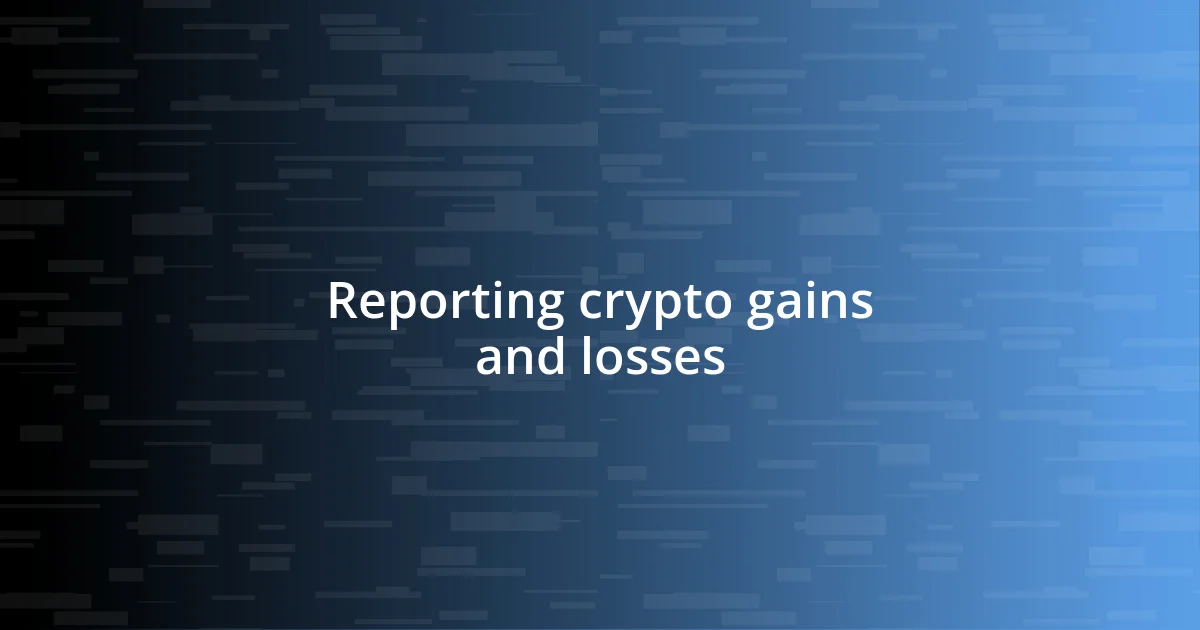Key takeaways:
- Cryptocurrency is treated as property by the IRS, making every sale, trade, or use a taxable event, highlighting the importance of understanding capital gains tax.
- Meticulous record-keeping of all transactions—including dates, amounts, and fees—is essential for accurate tax reporting and minimizing stress during tax season.
- Strategic tax planning, including tax-loss harvesting and consulting with a tax professional familiar with cryptocurrencies, can significantly reduce tax liability and optimize financial outcomes.

Understanding crypto tax essentials
Understanding the tax implications of cryptocurrency can feel overwhelming, but breaking it down helps. From my own experience, the first step is realizing that the IRS treats crypto as property. This means that every time I sell, trade, or even use crypto, it’s considered a taxable event—just like selling a piece of art or real estate.
I remember the first time I had to report my crypto gains; I felt a mix of anxiety and confusion. It struck me how each transaction requires careful record-keeping and an understanding of capital gains tax rates. Have you ever considered how holding onto a coin for over a year changes the way you’ll be taxed? It’s a big deal because long-term capital gains typically incur lower tax rates compared to short-term ones.
Additionally, I’ve learned that losses can be a silver lining during tax season. The ability to offset gains with losses through “tax-loss harvesting” really caught my attention. It instilled a sense of empowerment knowing that, with proper strategies, I could minimize my tax bill efficiently. Have you taken full advantage of this yet? Understanding these essentials lays the groundwork for making informed decisions in my crypto journey.

Taxable events in cryptocurrency
To truly grasp the tax implications in cryptocurrency, recognizing what constitutes a taxable event is crucial. I’ve personally navigated the challenges of reporting my transactions, and it’s easy to feel lost in the maze of regulations. For me, experiencing my first significant trade was eye-opening; I had no idea the IRS was watching every move. Embracing this reality forced me to get organized—tracking all sales, trades, and even when I transferred coins to friends.
Here are the common taxable events you should be aware of:
- Selling cryptocurrency for fiat currency (like USD).
- Trading one cryptocurrency for another.
- Using crypto to purchase goods or services.
- Earning interest or rewards through staking or lending.
- Receiving cryptocurrency as payment for services.
By understanding these events, I found that I could approach my portfolio with a sense of clarity. Each transaction wasn’t just a number; it became part of a larger picture, reminding me that I have to be diligent about my documentation. In my experience, staying informed helps me transform what could feel like a burden into an opportunity for strategic planning.

Reporting crypto gains and losses
When it comes to reporting crypto gains and losses, I’m often reminded of my first encounter with tax filing involving cryptocurrencies. It felt like a daunting puzzle—understanding how to categorize each transaction was both challenging and enlightening. I learned quickly the importance of maintaining detailed records for my gains and losses, as every bit of information adds up in the end. Have you considered how missing even one small transaction could complicate your tax reporting? It’s definitely a reality that hit home for me when I faced an unexpected audit.
The complexity of reporting is compounded by the need to differentiate between short-term and long-term gains. I vividly remember the moment I realized I could save quite a bit by holding onto my asset for over a year. The lower tax rates on long-term gains made a significant difference in my overall tax burden. This revelation motivated me to develop a holding strategy that aligns with my financial goals—after all, it’s not just about making trades; it’s also about making wise decisions for the future.
Navigating the emotional rollercoaster of reporting gains and losses in cryptocurrency can be tough. The highs of successful trades can quickly be overshadowed by the lows of a market downturn. I’ve found that regularly reviewing my transactions helps me stay grounded and prepared for tax season. An organized approach, including using spreadsheets or crypto tax software, can alleviate some of that stress, allowing me to turn what can be a painful process into a more manageable experience.
| Key Action | Tax Implications |
|---|---|
| Sell cryptocurrency for fiat | Taxable as a capital gain or loss |
| Trade one cryptocurrency for another | Taxable event, subject to capital gains tax |
| Use crypto for purchases | Taxable based on the fair market value at the time of purchase |
| Earn crypto through staking | Taxable as income at the fair market value received |
| Receive crypto as payment | Taxable as income based on fair value |

Deductible expenses for crypto traders
When I started trading cryptocurrencies, I was pleasantly surprised to discover that certain expenses could actually be deducted, providing some relief during tax season. For instance, costs like trading fees and commissions can significantly add up, and knowing I could write those off helped me feel a little less burdened. Have you ever thought about how these seemingly small costs can impact your overall profitability? They can really add up when you’re actively engaged in multiple transactions.
Another aspect that I found valuable was the ability to deduct expenses for educational resources and courses related to crypto trading. I remember investing in a workshop that gave me crucial insights into trading strategies and tax implications. It felt empowering to realize that not only was I gaining knowledge, but I could also offset that expense come tax time. It’s amazing how investing in myself not only informs my trading but also helps lighten my tax load.
Additionally, don’t overlook the deduction for hardware wallets or security tools you use to protect your investments. It’s something I never considered initially, thinking they were just part of doing business. But once I learned that these expenses could add value to my tax return, I felt a sense of relief. This knowledge empowers traders to be strategic, turning every dollar spent on enhancing their trading journey into a potential tax break. Isn’t it nice to know that you can invest in your future and potentially reduce your tax burden at the same time?

Record keeping for crypto transactions
When dealing with crypto transactions, I quickly realized that meticulous record-keeping is not just helpful; it’s essential. I remember my first year trying to track each buy and sell. I had transactions scattered across multiple platforms and wallets, and it felt overwhelming. What if I had missed recording something crucial? The dread of that possibility pushed me to create a system to log each transaction—a simple spreadsheet that eventually saved me countless hours of stress come tax season.
Additionally, I found that including dates, amounts, and relevant fees can make a world of difference when it’s time to report. Just last year, I lost a few receipts for small transactions, and it was frustrating trying to recall the details later. Those little pieces of information slip away fast! So, I now scan documents and keep a digital record. I can’t help but ask myself—how much easier would my tax life be if I hadn’t let those details slip through the cracks? A little forethought can save you from big headaches.
I also discovered that third-party apps tailored for crypto transactions can be invaluable for maintaining accurate records. I hesitated at first, thinking it would be an extra hassle. But once I integrated one into my routine, it became a game-changer. It automatically pulled in data from my various exchanges. Plus, I could generate reports with just a few clicks. Now, I feel confident knowing I’m preparing the best possible documentation. Isn’t it reassuring to turn a daunting task into a streamlined process?

Tax strategies for cryptocurrency investors
Navigating the tax landscape as a cryptocurrency investor can be tricky, but I’ve found that strategic planning can really ease the stress. For instance, timing my sales around the end of the year has saved me from getting hit with a hefty tax bill. As I look back, I remember considering a big sale that could’ve pushed me into a higher tax bracket. Instead, I chose to stagger my transactions, and it felt great to make a decision that benefited both my portfolio and my taxes.
Another strategy that stood out to me is tax-loss harvesting. It’s an approach I actually learned from a fellow trader at a meetup. They shared how they sold off some underperforming assets at a loss to offset gains elsewhere and lower their taxable income. I gave it a try last year, and I was amazed at the positive impact it made on my overall tax liability. It made me realize how proactive moves can turn challenges into opportunities—have you ever thought about how you could turn losses into potential tax benefits?
Finally, I can’t stress enough the importance of consulting with a tax professional who understands cryptocurrency. I’ll never forget the relief I felt after having my tax situation reviewed by an expert who specialized in digital assets. They helped me identify deductions and strategies I had overlooked, transforming what felt like a daunting task into an enlightening experience. If you’re investing in crypto, why leave your financial future to chance? A little expert guidance can make all the difference in navigating the complexities of taxes.

Common mistakes in crypto taxation
Many individuals new to the crypto space often underestimate the tax implications of each transaction. I remember my initial thrill at making trades without fully grasping that every buy or sell could trigger a taxable event. It’s staggering how easy it is to overlook these details, especially when the focus is on the market’s excitement. Each transaction isn’t just a number on a screen; it carries potential tax consequences that can catch you off-guard later.
Another common mistake is failing to report income from staking or yield farming. In my journey, there was a time when I received rewards and assumed they didn’t count as taxable income. Little did I know that the IRS views those rewards as ordinary income! How did I learn? Thankfully, I caught it before filing, but it was a wake-up call. I can’t help but ponder—how many are missing the boat on this?
Finally, thinking that crypto is a “wild west” where regulations don’t apply is a dangerous fallacy. I’m often surprised when friends shrug off the need for compliance, believing that penalties won’t affect them. From my experience, I learned that ignoring regulations can lead to severe tax repercussions. The stress of being audited or getting hit with fines is not something I’d wish on anyone. Have you considered how much peace of mind comes with staying informed and compliant?














